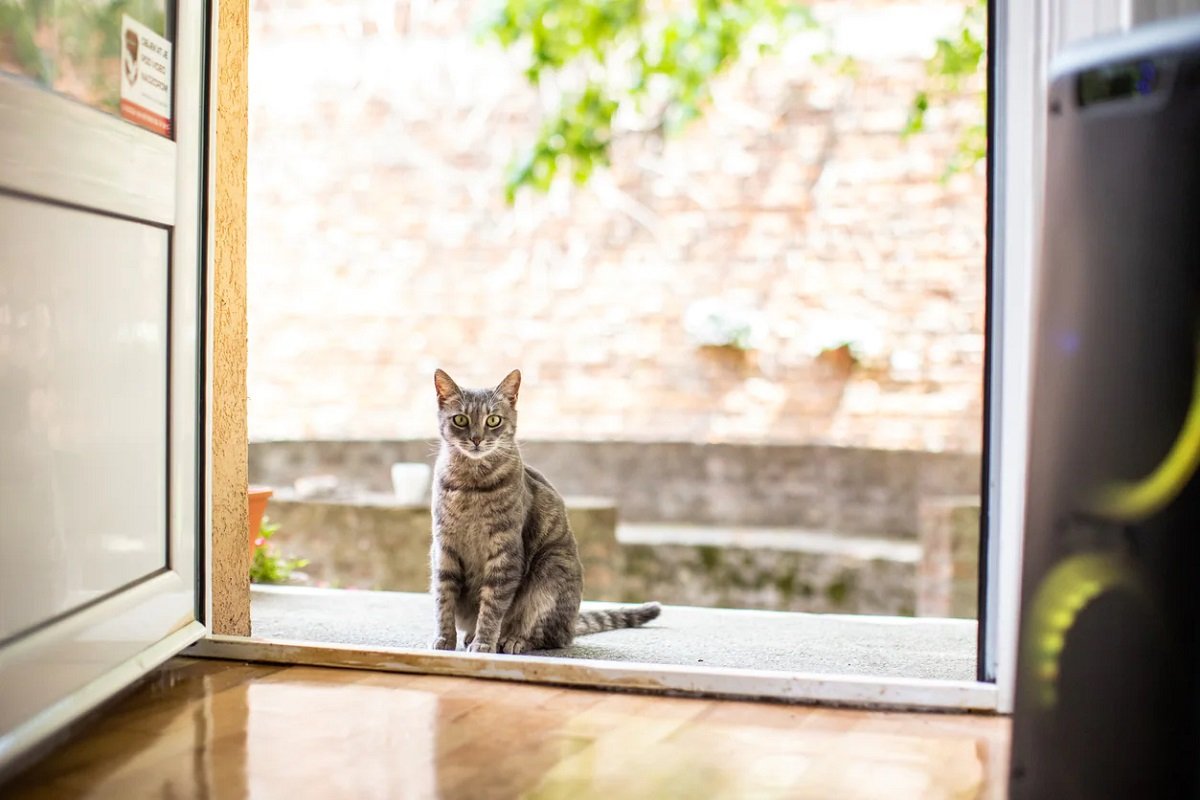Will My Cat Come Back If I Let Him Outside?

It’s hard to know when they’re old enough to go outside on their own and how to get them ready for that day. As a pet owner, there is also a huge worry: will my cat come back if I let him out?
It’s scary to think that your cat might not come back, which can make it hard to let your cat outside. Because of this, some people decide to keep their cats inside, but even cats who live inside often want to go outside. Your cat will come back home if you take the right steps.
In this article, I’ll tell you will your cat come back if I let him outside, no matter if it’s a kitten, an adult cat, or a cat that has always lived inside. I’ll also talk about the pros and cons of letting your cat go outside, so you can decide what’s best for your cat.
Read More: What Happens if Cats are Left in a Dark House?
Table of Contents
What Happens If I Let My Indoor Cat Outside?
How you teach or train your cat will determine the answer. Aside from that, think about where you live, like if you have a big yard or if you live in a small apartment or condo. Before you let your cat go outside, you should make sure he is comfortable in your home.
It will make him think that your place is his safe place, so he will feel safe and secure. Now, if you have a big yard, you can walk around with your cat and show him all the different parts of your property.
This can be done while you watch, so you can keep an eye on your cat. If you have a big yard where your cat can run and explore. On the other hand, living in a condo or apartment in a building could be more difficult.
If you let him run free in the park, it could be dangerous to bring him there. When your cat doesn’t know every corner of the building where you live, it is easy to get lost.
How Do I Let My Cat Outside for the First Time?
If you let your cat outside, will it come back? Yes! But if your cat has never been outside, you need to make sure they are ready for the big world. You should slowly let them go outside to help them adjust and make sure they always know how to get back home.
Here are all the steps you need to take to make sure your cat can live outside and always makes it back.
1. Take Their Breed Into Account
Most cats can live outside safely, and they love to spend as much time as possible there. But some breeds aren’t made to live outside and should only be kept inside.
For example, breeds like the Sphynx that don’t have hair aren’t ready for the great outdoors. They can’t control their body temperature because they don’t have fur, and they can’t live in harsh weather. The short coats of the Cornish Rex and Devon Rex mean that they can only live inside.
Even cats that are usually good for cuddling are not good for living outside. Ragdolls, Persians, and Russian Blues are all in this group. They aren’t aggressive, so they wouldn’t do well in a fight. They also like to sleep and are perfectly happy to do so next to you.
2. Positive Environment
Like people, cats like to go back to places where they feel safe, loved, and happy. So, if we want our cat to stay at home, we need to make it a good, peaceful, and safe place. Each cat needs its own place to sleep, eat, and go to the bathroom.
A lot of clean water is also needed, as well as improvements to the environment. They need something to keep them interested and keep them from getting bored. Keep in mind that a bored cat is more likely to try to get away if it doesn’t get what it wants.
3. Make Sure They’re Ready
It’s great if your cat is a breed that can handle being outside. But you have to make sure they are ready to face the outside.
You shouldn’t let your kitten outside until he or she is about 4 months old. This lets your kitten get used to your home so that it knows where to go when it needs to go back. By this age, they should also have had all of their shots and been neutered, making it safe for them to go outside and explore.
Things are a little different for people who have an adult cat. If you just got an adult cat, you should give it 4-6 weeks to get used to its new home before letting it out, even if it used to live outside. They need to figure out that your house is now their home.
What if a cat that lives inside wants to go outside? If your cat is acting like it wants to go outside, it is probably ready. They will already know that your house is their home, and by the time they are adults, they will have had all of their shots. If they want to see the world, let them!
On the other hand, cats that are very happy living inside and don’t want to go outside shouldn’t be forced to go outside too soon because they could get very stressed out. It’s best to look at each situation on its own and do what you think is best for your cat.
Read More: What do cats like to eat for breakfast?
4. Proper Attention
A cat’s home isn’t complete until the people who take care of it love and care for it. You have to set aside time to play with your cat and get to know him or her.
Care also means giving them the right food and nutrition, letting them learn and socialize, and not crowding them too much or giving them too many treats that are bad for them.
5. Ensure Your Cat Can Be Identified
Once you know your cat is mentally ready and has been neutered and vaccinated, you need to make sure it can be found if it gets lost. Get your cat chipped at all times. The microchip will be linked to your contact information and can be scanned to safely bring your lost cat home.
Even if your cat has a microchip, you should still put your phone number on a cat collar. The only way to read a microchip is with a scanner, so putting your contact information on a collar is a better idea. This should mean that your lost cat will be found faster.
6. Preventative Medicine
Every cat needs the right amount of preventive medicine to stay in good health and act normally. So, remember that you’ll need to see a vet every six to twelve months.
Respect their schedules for getting shots and getting rid of worms. This means that if your cat does get out, it will be better prepared to stay healthy and not get sick.
Read More: How to Get Rid of Fishy Smell From Dog?
7. Prepare a Safe Outside Space
Even though many cats like to roam and will often go exploring outside of your garden, you can keep them from going too far by making your yard safe and inviting. It’s not hard to make your garden cat-friendly; just give them a lot of different things to look at and do. For instance:
- High up places that they can climb and have a good view of your garden
- Enclosed are places that they can hide and feel safe
- Non-toxic and cat-friendly plants they can discover and sniff
- Shelter from bad weather conditions
- Something for them to scratch, such as a tree
- Empty sunny spots that they can relax in
You also need to make sure your garden is safe. Cover all ponds so that your cat doesn’t fall in or drink the water. Some weed killers and chemicals used to get rid of pests are also bad for cats, so look for options that are safer and better for the environment.
8. Sterilization
These are the best ways to control reproduction, whether you castrate or neuter a male cat or have a female cat spayed. You must not only stop them from getting pregnant, but you must also take away their ovaries or testicles to lessen their hormonal urge and their chance of getting away.
Talk to your vet about the best way to get your cat spayed or neutered before you do anything else. The expert will be able to tell you how to do it best and what to expect.
9. Train Your Cat to Come When Called
You should also teach your cat its name and train it to come when you call it before you let it outside. Using treats works great for this. Just say their name and shake a bag full of their favorite treats. When they come to you, give them a treat and a scratch in their favorite spot.
We get money from our readers. When you buy something through a link in this post, we get a small cut. Find out more.
10. Letting your cat outside for the first time can be stressful.
When you first let your cat outside, choose a day with no loud noises and no rain, so that your cat has a good first time. You’ll also need to be there when they go outside for the first time.
Before you feed your cat breakfast, open the back door so they can go outside. When your cat does go outside, give them about 30 minutes to look around at their own pace. Try not to pick them up, because it can scare them.
Get their attention and tell them to put down their breakfast. Do this every day and slowly extend their time outside until they are comfortable being outside on their own.
Keep in mind that cats are naturally cautious, so they probably won’t just run out the door. Most will take their time and carefully look around as they go.
Let them explore at their own pace, and don’t worry if they jump over a fence or go further than you’re comfortable with. Most cats will come back after a few minutes, and you can entice them back with a tasty treat.
11. Positive Reinforcement
You can’t just leave your cat outside and expect it to come back if you want it to be an outdoor cat. You could start by letting them explore a small area outside and then slowly expand it.
When your cat comes back, be ready to love, comfort, and reward it (whether in the form of food or a toy). This will help them remember that coming back is a good thing. Because of this, they will be more likely to come back.
How Do You Train A Cat To Go Outside And Come Back?
Cats are, of course, animals that mark their territory. So, when your cat goes outside, it can quickly go back to where it lived before. Only if you live in an apartment or condo inside a building will you have a problem. Leaving your cat alone is a risky thing to do.
But we know that there are times when your cat could get lost and you want him to come back safe and sound. Leaving your cat alone is a risky thing to do.
But we know that there are times when your cat could get lost and you want him to come back safe and sound. If that’s the case, you can start by taking your cat outside with you on a leash. Yes, it can be annoying to put them on a leash, but you don’t want them to run away and get hit by a car or attacked by wild animals.
When you go for a walk with your cats, always bring food and toys with you. Just carry your cat outside for a short time and then bring him back inside. When you get back, you can take the cat’s leash off and give it a treat.
Read More: How to Get a Vizsla to Stop Whining?
Conclusion
So, if you let your cat outside, will he come back? Most likely, yes! As long as you slowly and safely introduce your cat to the outside world, it should always come back home.
That doesn’t mean there aren’t risks in the outside world. There is always a chance your cat could get lost, taken in by another person, or get trapped or injured. However, by putting the right precautions in place you can give your cat a happy and enriching outdoor life while keeping them as safe as possible.
Read More: How to Get Rid of Fishy Smell From Dog?
Frequently Asked Questions (FAQs) about Will My Cat Come Back If I Let Him Outside
Can an indoor cat survive outside?
While some cats may love spending time outside, it is typically better to keep cats indoors. Allowing your favorite animal family member and the general public to be outside can offer a number of risks. Many people are unaware of the potential dangers until it is too late.
Do cats run away if they are unhappy?
Although cats fleeing are sometimes linked with rage, it is more frequently than not associated with sheer fear. Maybe the cat just doesn’t trust you yet. When cats are terrified, they frequently freeze as an instinctive reaction, prompting them to flee the area.
How do you attract a cat back home?
Use strongly scented canned cat food that your cat can detect from a distance so that your cat knows where to go for meals. Also, place your cat’s litter box and any bedding with your cat’s fragrance outdoors to entice your cat to return to your house. Cats have an incredible sense of smell!
How do I make sure my cat will come back when I let it out?
Take a food/toy reward out with you and sit down quietly. This way you can keep an eye on your cat while letting them explore freely and call them back if you feel like they’ve wandered too far. You should build up the length of time your cat is outside over a few sessions.
How long do cats go missing for?
In our experience, it is not unusual for a cat to be MIA for 24 hours at a time. Some cats even disappear for two to three days at a time. But, no matter how often they do it, or how street-smart they are, it can still be a worrying time for you if you think you have a lost cat.
How do I get my indoor cat to come home?
Try to get as much of your scent outside so the cat can smell it and will stay in their hiding spot knowing that they are close to home. Shaking a food dish, treat jar or favorite toy will sometimes lure animals out of a hiding place.
How long does it take for a cat to forget its old home?
You may be wondering if your cat will remember you after you’ve been away on holiday or if your friend’s cat remembers you after you spent a week pet sitting. A cat’s short-term memory lasts around 16 hours (if it is something that your cat thinks is important to remember) and their long-term memory is indefinite.
What do cats do when they go outside?
When out and about, cats are more likely to spend their time climbing, running and exploring which is all excellent for their physical health. The great outdoors is also proven to be better for your feline’s mental health. This is largely due to the vast variety of smells, sights and sounds to stimulate their senses.
Why Do Cats Disappear and Go Missing?
Cats sometimes run away and go missing, and sometimes they return home. They can be gone for several days or disappear entirely. For a cat guardian, this is an emotional and upsetting experience. We often trust our cats to return home, but what happens when they don’t?
Should I let my cat go outside if he wants to?
The biggest advantage of allowing your cat to venture outdoors is that there are more opportunities for physical activity. Outdoor cats tend to spend their days roaming and exploring and do a good bit of running and climbing in the process. And when your cat stays active, they are less likely to become overweight.





